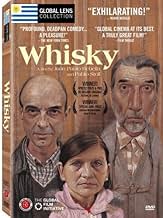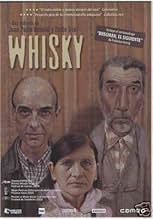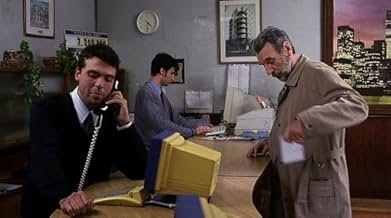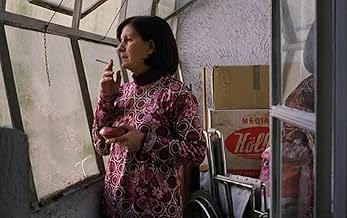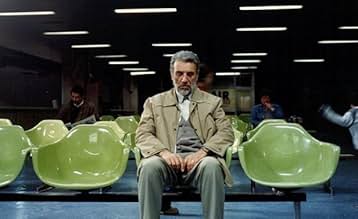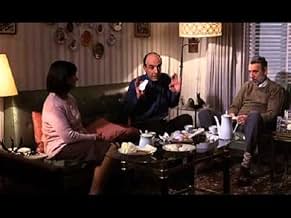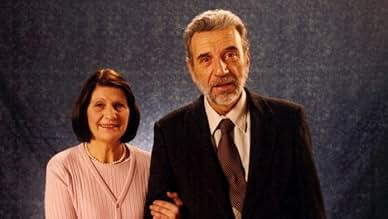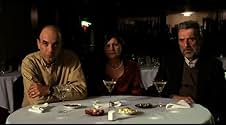Quando il fratello perduto da tempo riemerge, Jacobo, nel disperato tentativo di dimostrare che la sua vita ha significato qualcosa, cerca di trovare una moglie.Quando il fratello perduto da tempo riemerge, Jacobo, nel disperato tentativo di dimostrare che la sua vita ha significato qualcosa, cerca di trovare una moglie.Quando il fratello perduto da tempo riemerge, Jacobo, nel disperato tentativo di dimostrare che la sua vita ha significato qualcosa, cerca di trovare una moglie.
- Regia
- Sceneggiatura
- Star
- Premi
- 23 vittorie e 7 candidature totali
- Karina (empleada fábrica 1)
- (as Verónica Perrota)
- Empleado Cambio
- (as Ignacio Mendy)
- Fotógrafo
- (voce)
- Hija de Herman Köller
- (as Leonor Svarkas)
Recensioni in evidenza
This movie is subtle, and thoroughly enjoyable. The performance of the actors is simply incredible. Marta is a demure middle-aged woman who probably has not shared much love in her life. You can sense her burning desire to settle down and to share love and shelter with a man. Jacobo and Hernan are two brothers with opposite personalities. They have never talked to one another, and it is probably too late now. Each of them is clumsy and unintentionally cruel in his own special way. The two directors did an amazing work in the script. So little is said, or even shown, and so much can be felt about the characters (the two brothers who failed to deal with their emotions, about Marta and her life). The movie is also a chance to see some of Uruguay, particularly Montevideo and the seaside. A very nice break from Hollywood well-formated products. We'll wait for the new opus from these two young directors with great anticipation.
The Uruguayan directors Pablo Stoll and Juan Pablo Rebella, following their previous effort 25 Watts (2001), once again centre their story in the small, provincial town of Montevideo. Jacobo Koller owns a modest sock factory that employs a few local women, including Marta. A year after his mother's death, his successful businessman brother Hermann visits from Brazil to attend the memorial. Jacobo requests that Marta pretends to be his wife while his brother stays. After the ceremony, the three take an impromptu trip to a small seaside resort.
While this premise may sound overly familiar from a million-and-one lightweight US sitcoms, the delivery is never short of fresh and intriguing. It rarely approaches the sort of twee sentimentality we might expect after reading a short synopsis. Almost nothing is said for the first half of the film as we observe the characters' drab, innocuous lives. And yet, despite this, the film somehow succeeds in upholding a surprisingly light and comic atmosphere. There are genuine moments of deadpan humour. The actors (schooled in the reticence of the national theatre) never force the comedy, in fact it is more often the camera that delivers the punchline; the constant repetition and rituals, the framing of the lanky Jacobo and squat Marta and a sudden romantic karaoke sequence that is all the more touching for its spontaneity.
Like the titular drink, Whisky is warm, satisfying and definitely suitable for repeat viewings.
You go through the routine of sleeping and waking at the same times, travelling to work on the public bus, spending your day at your job which doesn't give you any kind of immediate remuneration. Your mind idles off to whether the money for the job is worth spending your life on, then you take the public bus home again, looking out at the sights you are used to, listening to the music you feel the most comfortable in. And usually on this bus ride home, most of the angst you feel in the morning is replaced by a irrepressible fatigue that tells you honestly that life is not just about chasing pipe dreams; life is also about going through it as best you can and surviving.
And as this goes on you get used to not expecting much out of life, not expecting much out of relationships, because that's the easiest way to be, just being. There is not much need to expand, really. There is not much need to feel the crests and falls of emotions. There is not much need to continue seeking, to continue dreaming, to continue hoping. And this is by no way any mistake; this is only part of the process of going through life, getting eased into it to not allow yourself any more anger that comes from lost hopes. Soon, as you get settled into your groove, you don't find going through the same days mundane anymore. You don't question what is expected of you out of life. You don't feel the need to keep expanding and expanding anymore.
Once in a while, you grant yourself the pleasure of watching a picture in a darkened cinema, vicariously and voraciously living the lives of people you don't know; people whose lives seem more exciting than yours; people who experience highs and lows so much that you feel as if you are experiencing the same highs and the same lows. You sit alone in the darkened theater by yourself--you are used to being alone--while somewhere else behind you, young couples are busy checking each other's necks out with their tongues. You see this, but you don't bother. You are only interested in the people living on the screen with you, sharing with you their pains and their hopes. Then you walk out of the cinema, and your life returns back to you. You realize that it is only a short relief, before you have to face reality again, the reality that you are really not so special.
Sometimes, the people in the movies cease being characters. They cease becoming people whom you fantasize about or feel pity for. Their lives suddenly seem so mundane and simple to you, and like you, they have stopped dreaming and started living in the real world. You see their everyday movements, everyday actions of endless repetition, and their normal, placid emotions that do not dare affect them in their daily lives. You grow so used to the repetitive actions, the repetitive shots, the repetitive dialogues, their every movement, that you find them so familiar. You feel as if you are sharing in some of their private lives, even if it is just make-believe. And when they discover something kind or special in their routine lives, your eyes widen and your heart fills with warmth. Mundane lives can be so beautiful too! You tell yourself secretly.
And in their daily effort to live, you see how their lives subtly affect other people's lives. You see how such small acts of kindness, can gladden your heart. You see how they are used to their loneliness, and then when they find companionship, you see how gladly they hang on to them, no matter how minute their friendship may seem. You see how comical they are in their lonesome blues, and you sneak a laugh at them, knowing fully that at the same time, you are laughing at yourself and with them too. Then you find that after all, there is comedy in pathos, and there is sorrow in bliss too.
At the end of the movie, the movie ends and the characters fade away into the blackness of the screen and the dark recesses of your memories. And suddenly you miss the repetition that bored you earlier, the simple mundaneness that was conveyed so simply. As you walk out of the cinema and see people walking out together with you, you feel more alone than ever before, as you're deprived of your newfound friends that you have fallen in love with in that short span of 95 minutes; like when you get used to being with other people, being lonesome again suddenly seems so difficult. And as you sit at the back of the cab on your way home, you feel that you've lost something special, even if that specialness came from make-believe situations, and a tear runs slowly down your cheek.
Jacobo Köller, a terribly lonely middled-aged man, owns a falling-apart sock factory in Montevideo (Uruguay), which now is reduced to barely 3 workers: 2 girls and Marta, Jacobo's supervisor/ secretary, a terribly lonely middle-aged unmarried woman. Both Jacobo's and Marta's lives are plagued by the most painful routine, mirroring the drab, moribund sewing machines at the factory and Jacobo's agonizing old car.
When Jacobo's elderly mother dies, his younger, successful brother Herman, who lives in Brazil, comes to Uruguay to attend the Matzeivah. Jacobo, who has a distant and resentful relationship with his brother, asks Marta if she will pretend to be his wife for a few days so he won't have to cope with his brother all by himself. Marta agrees and this experience will be life changing for her.
"Whisky" is a 3-character movie in which you have 2 opposites that won't move (the two brothers) and one in motion (Marta). We see how Jacobo (the older brother) has trapped himself in rigidity, lack of ambition and shortsightedness. We see how Herman (the younger brother) possesses this most coveted "secret", that is, the ability to enjoy life even in negative circumstances (don't be afraid, he's no Pollyanna). But the film is really about Marta, who slowly realizes there's more to life than be stuck to the same exact routine everyday waiting for decay and death, and that machines and humans function differently.
"Whisky" is also a film about Uruguay, represented here in Jacobo's character. This once prosperous country, a stalwart of democracy, nicknamed "the Switzerland of South America", is now a country in dire need of technological updating, of restoration of its architectural treasures, and of serious political planning and execution of its economic and social future, and is paying high stakes for decades of unrealistic labor legislation and the aftermath of a traumatic dictatorship in the 1970s and 1980s. To prepare the future, one must take care of one's past, but also be prepared to bury the past when necessary (like the brothers have to bury their mother). There are no easy solutions.
The film is never obvious or boring, has a slow but skillful pace perfectly in tune with the characters' rhythms, and has a very becoming change of sets when the 3 characters go to a decadent seaside resort, Piriápolis, which is decisive for Marta's transformation. The editing is precise and the music well employed. The acting is no less than superb, all three actors OWN their characters and modulate in the subtlest ways, thanks to masterful script and direction. Of course, those characters have to be played by middle-aged actors with no face-lifts or botox, so a Hollywood remake is out of the question!
The warmest bravo, though, must go to the directors' choice of art direction and locations: they are priceless! Every location in this movie (the factory, the resort hotel, the Jewish cemetery, the soccer stadium, etc), every set, every decadent prop, sewing machine, car, table, elevator, computer, clock, typewriter, lamp, glass, telephone, radio or TV set, everything is both an incredible memorabilia of a "temps perdu" and a symbol of a technology long surpassed, "misfit", dead.
Perhaps the most original feature in "Whisky" is the way the film portrays Jacobo's character. We witness his total lack of ambition and real productivity, his overlook of labor rights (his employees work 12 hours daily!), his inability to perform the simplest tasks like washing dishes, having his car repaired or using an electric drill, and we initially tend to feel sorry for him, because he's apparently so harmless, helpless and unaggressive. But as the film unfolds, we see how his stubbornness may in fact be a sign of stupidity, how indifference can trigger sexism and fascism, how resentment turns into inflexibility, shortsightedness into blindness, and conformity into paralyzing rigidity, we realize this is one of the most appallingly cruel, believable and poignant movie characters in a long time. It's the humane but reckless portrait of a man who, by sticking to the past and refusing to change, contradicts the very essence of life itself: movement.
If you're in the mood of a sensitive, subtle, richly rewarding movie, don't miss this one - and it can be a life lesson too! My vote: a solid 8,5 out of 10.
Lo sapevi?
- QuizJuan Pablo Rebella's last film.
- Citazioni
Marta Acuña: Namreh Rellok.
Herman Koller: Come again?
Marta Acuña: Your name spelled backwards. Herman Köller.
Herman Koller: How is that?
Marta Acuña: Namreh Rellok.
Herman Koller: Huh! That's great. Say something else.
Marta Acuña: Like what?
Herman Koller: Um..."Hello, how are you?".
Marta Acuña: Olleh, woh era ouy?
Herman Koller: [laughs] That's great. Say "the sea is choppy".
Marta Acuña: Eht aes si yppohc.
[both laugh]
Herman Koller: "The girl plays with the dog".
Marta Acuña: Eht lrig syalp tihw eht god.
Herman Koller: "The wind swings the palm tree".
Marta Acuña: Eht dniw sgniws eht mlap eert.
Herman Koller: That's great. How do you do it?
Marta Acuña: I don't know. When I was little I'd get bored and read words backwards. I'd listen to conversations and spell them backwards.
Herman Koller: [looks at Jacobo walking towards them] "Jacobo is upset".
Marta Acuña: Obocaj si tespu.
[both laugh]
I più visti
- How long is Whisky?Powered by Alexa
Dettagli
Botteghino
- Budget
- 500.000 USD (previsto)
- Lordo in tutto il mondo
- 633.761 USD
- Tempo di esecuzione1 ora 39 minuti
- Colore
- Mix di suoni
- Proporzioni
- 1.85 : 1
Contribuisci a questa pagina


